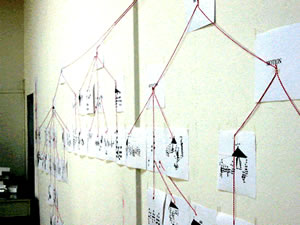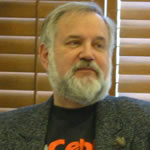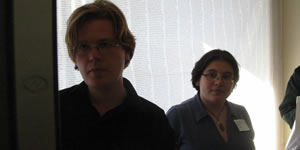Santa Fe
As regular readers have noticed, I need a break. I'm going to spend the week in Santa Fe, looking at old things and studying new cooking.

As regular readers have noticed, I need a break. I'm going to spend the week in Santa Fe, looking at old things and studying new cooking.

It's nice of ELO to send me an open letter. No doubt they thought it looked like fun. I think everyone in the field understands the issue by now. (Matt Kirschenbaum say he doesn't understand, but I think he's too modest. Don't you?)
But, if you want to go into it more deeply, let's take a look at one item in the ELO list of lost or threatened works.
Kathryn Cramer, Jacuzzi, Subpeona, Vacation, Black Mark . HyperCard stacks on floppy. Scattered copies on threatened platform
ALERT: This is about to get all pedantic. Sorry. The PAD People want to be archivists and librarians. Let's take a closer look at this first, preliminary bit of archive-making.
Jacuzzi was written in and around a jacuzzi at a conference. Some other famous writers were in the hot tub, too, and they lent a hand. It was sketched in Storyspace, not HyperCard, and was later incorporated in the Brown's Hypertext Hotel MOO.
Subpoena Vacation is one work, not two. Note that the ELO entry misspells Subpoena, too. (Spelling complaints are pernicious, but librarians care about getting the spelling right because a misfiled work is proverbially a lost work) Subpoena Vacation started in Storyspace, and later was moved to Macromind Director. It never was a HyperCard stack. It remains unfinished, and has been under contract to Eastgate for many years.
Black Mark was a joke, a small, satirical pamphlet Cramer and other student volunteers produced at the end of Hypertext '96 with caricatures of Ted Nelson, Michael Bieber, Mark Bernstein, and other Hypertext research folk. It was not a HyperCard stack, it was not even an electronic work.
We started with an impressive list of four threatened or endangered works. Poof: there's not much left.
Fact checking this wouldn't have been hard. Cramer is a well-known and exceedingly well-connected anthologist and editor. She's in the phone book. She's in the Eastgate catalog. She's a regular at many conferences and conventions. She runs The NY Review of Science Fiction. She has a Web site. When I phoned, she returned the call in fifteen minutes.
Nobody bothered to check. The rest of the list is full of stuff like this. Works attributed to the wrong author. Works that moved to a new server and are easily found by Google. Works that are in print -- works you can pick up the phone and order from their original publisher.
Scholarship matters. Scholars have a public duty to the truth -- just as policemen, judges, and physicians have their own special duties. Let's face it: reasonable care would have caught these errors, and reasonable care is what we expect from scholars -- and librarians. These aren't subtle questions of classification or technology; before you tackle those, you simply have to get the basics right. And, when mistakes get published, correcting them is vital. It's that simple.
Benediction: Everyone, take a deep breath. Calm down. I'm a scientist; scientists, too, have duties. I've been in this field for 20 years, I'm hoping to be around for a long time. Let's get back to work. The work matters. Getting it right matters. You know this.
BuzzMachine blogs the Salam Pax interview in Tekka, evoking a storm of comments.
Ken Hagler uses Tinderbox to make notes while playing Uplink. Clever!
Hypertext critic J. Yellowlees Douglas introduces reading logs as an approach to discussing the way meaning unfolds in complex hypertexts. Game Theory folk might find this a handy method for looking more closely at the way the light dawns in complex games.
Headmap, a weblog on location-aware devices, has a long and intriguing discussion of Tinderbox and related hypertext tools and their possible role in the semantic web.
The Swedish movie Fucking Åmål, released in English-speaking countries as "Show Me Love", is wonderful. The blurbs at Netflix and IMDB are all wrong; it's not about the incredibly true adventures of two girls in love, which was also a good movie. It's about growing up in a backwater town like Åmål, where new things are already passé before they arrive. The Last Picture Show without the McMurtry wierdness.
The new issue of Tekka is out.
Mark Meadows' journey to Baghdad and Basra, with its Salam Pax interview, is breathtaking. But there's a lot more to see. Cathy Marshall has a very important caution about scenarios and personas. Bill Bly talks about the problem of the narrator in artifactual fiction. Biz Stone looks at iPhoto. Aaron Swartz explores the aesthetics of small code.
And Singaporean Don Bosco presents an exciting new hypertext fiction, Fast City, with an introduction by George P. Landow.

In film or on the street, people who describe themselves to you are lying. Here is the difference: In the bad film, the fellow says, 'Hello, Jack, I'm coming over to your home this evening because I need to get the money you borrowed from me.' In the good film, he says, 'Where the hell were you yesterday?' -- David Mamet, On Directing Film
The core challenge of the weblog is simply that we're always coming into the middle of the story. If you're always explaining, you'll never get around to what matters. Where the hell were you yesterday? But the reader is always walking in at the wrong moment. How can anything make sense, if you're not always explaining?
People figure it out. That's what people do -- they build chains of cause and effect. But they'll only take the trouble to figure it out if you make them care -- which means, in the end, if you show how much it matters to you. Where the hell were you yesterday?
Links help. People will construct theories about what's happening. As things happen -- as they come back tomorrow to see how it turned out -- they'll often discover that their theories weren't quite right. (You'll discover the same thing, too: sometimes you don't get the job, or the girl. Some days you win, some days you lose, some days it rains.) But links let people figure out what happened before, helping them form better theories.
In the past months, many weblogs have pondered Iraqi blogger Salam Pax. Is he real? A fiction? Paul Boutin summed up the evidence last month:
Speculation continues that Dear Raed , the weblog of a young man in Baghdad who posts under the name Salam Pax, is a hoax, perhaps even a disinformation campaign by the CIA or Mossad. A month after Computerworld published a story quoting a "terrorist" who turned out to be one of their former writers pranking them, it would be foolish not to wonder.
An interview with Salam Pax by Mark Stephen Meadows, to appear in Tekka this week, appears to close the book on the question. Salam Pax is real.
So, we know that Meadows met someone in Baghdad who said he was Salam, and who has access to Salam's weblog. This doesn't completely preclude some off-the-wall scenarios -- perhaps Salam flew to Baghdad for this interview, having posted his weblog from Wisconsin through an Iraqi intermediary? But what would be the point?
As I've written previously, we worry about the authenticity of weblogs more than we ought. Kaycee Nicole was true, although she was a fiction. Isabella (new URL) revealed an important lesson about thrillers that the interactive fiction community had overlooked. Salam reminds us that people can be who they say they are -- that, sometimes, things are pretty much what they seem.
Of course, we still have all the questions about reality that face any reader. When Salam offers an opinion, or I do, is this precisely what he believes? Of course not. We write things we believe, we write things we want to believe, we write things we ought to believe even though we cannot believe them. We write about who we were, not who we are; we write about who we wish he had been and what we wish we'd thought to say. Isn't that more true, in the end, than a recording?
We're finishing a new issue of Tekka. Lots of great things.
One of the latest developments is a photo-essay from Baghdad and Basra, including an in-person interview with Iraqi weblogger Salam Pax. I didn't actually get to say, "hold the presses", but it's been an exciting 24 hours.
Martin Fowler (Refactoring guru) has started a tech-rich bliki, a cross between weblog and wiki as a repository of ideas on software development.
In the new Tekka -- out very soon -- I have a long review of books about community and the Web. It's called slums of cyberspace.
This weekend, I've been scratching my head about the problem posed by trolls and snerts in support forums. They're incredibly expensive, both in dollars and in morale. My best idea so far is to put a toll on the channel. If you want to come in, read, write, and have a direct channel to the designers, you pay an initiation fee. It's a private space. You're welcome to use the facilities. If someone bothers other members, they're politely shown to the street.
A nominal charge -- say $20 -- would keep casual tirekickers and cyber-graffiti poseurs away. Of course, shoppers won't be able to benefit from forum discussions any more, which is too bad; perhaps we'll assert rights to reprint edited forum material in the public area at our discretion.
Alternatively, we might try a bigger price -- $100 seems right -- and offer some premium service. iChat support, for example. Access to betas.
Dave Winer is mistaken: you can get good pastrami in Boston, although you cannot get good corned beef. (Boston people have their own idea of corned beef. It's not a very good idea, but they're entitled. CF. New England Boiled Dinner.)
Dave, on the other hand, is not mistaken in today's long and important reminder that software ought to cost money. There is nothing outside the economy. You can believe all you want in Open Source or viral marketing or gift economies or the GDR, but you still can't find the outside of the economy. If you don't pay money, you pay something else. (In fact, you pay more -- because when you pay in funny currencies like quatlu's or prestige or tenure, you also have to pay the vigorish for the exchange rate.)
Update: Aaron Swartz takes me to task. He observes that some people might write software in their spare time, or be compensated in other ways. For example, university professors aren't officially paid to create programs -- but they may need to create programs and write papers about them in order to keep their jobs.
My answer is that indirect payment is still payment. Sure, you can hire a programmer, pay them a salary, tell them what you want written. The software is yours. You don't pay for additional copies -- but it's not free, any more than hiring a carpenter to build some shelves for your kitchen makes the shelves free.
Sure, you can give away free copies of the software you commissioned. The recipients don't pay you -- the software seems 'free'. But, sooner or later, value of some sort flows back up the system. If it doesn't, nobody will do it again. And that value is always something convertible to money: that's why they call it money.
It's all speculation, all new and innovative software, all researh. You can speculate by creating it yourself. You can speculate by hiring someone to make it for you. You can speculate by betting your tenure chances. You can speculate by coming up with a really good message, marketing it like crazy, and recruiting volunteers to paint your fence write your code.
The differences between these modes of payment are interesting in themselves, and get involved in some interesting questions of risk arbitrage. But they're little differences -- percentage points. It's nice if we can use these differences to reduce expenses -- but it's still going to cost, we're still going to pay.
You can shift the payments to different accounts -- paying in tenure instead of dollars, or buying a programmer instead of the program. Just don't be fooled by your own accounting tricks.
Ellen Ullman in the Times:
But more than jobs have been lost. To listen to Mr. Engelbart that day almost five years ago was to realize that the computer industry, when it started, was not simply about becoming a chief executive or retiring on stock options at 35. It was to remember that real innovation — the stuff that made computers so much more than "crummy factors of production" — comes from mysterious places, wild people, dreamers and tinkerers, and to remember all the skepticism they had to endure.
Dave Winer and Tim Bray each write today about the terrible damage we are inflicting on the software world. Winer writes:
Today software and music, software and writing, software and all kinds of creativity, are indistinguishable.
and asks, "Who will pay for software?" Bray observes that corporations today are unreasonably risk averse, that writing a small software order requires Permission From The Top, and that this stifles everyone. He's trying a shareware strategy for big-ticket systems.
My intuition is that trying to make brilliant, innovative software is hard, and trying to establish brilliant, innovative business models is hard, too. Trying to do both at once might be too hard for anyone. But, you never know, and it's worth a try. Nothing else is working…
I touched on this recently when I observed that the call for freeing artists from the need to program is really an effort to see scientists and engineers as subhuman.
I was going to discuss Tufte's new broadside, The Cognitive Style of PowerPoint, but Aaron Swartz has already done it beautifully -- in the form of a PowerPoint outline.
This 24-page handout is very fine reading indeed, and is produced with to the elegant standards of Tufte's classic books. The net may spawn a revival of the print broadside -- brief pamphlets and articles that once were a staple of the press but vanished in this century. Advertising-subsidized magazines pushed them out of newsstands, inexpensive books and then paperbacks pushed them out of bookstores, and soon they had no retail channel at all. It's a long shot -- the web is even better, after all, at electronic delivery. But you never know.
Gene DeRose and Stuart Moulthrop have also resigned from the Board of the ELO.
Tim Bray helped invent RDF, the metadata standard that underpins the semantic Web. Now, he thinks RDF is broken.
"RDF has ignored what I consider to be the central lesson of the World Wide Web, the “View Source” lesson. The way the Web grew was, somebody pointed their browser at a URI, were impressed by what they saw, wondered “How'd they do that?”, hit View Source, and figured it out by trial and error.
"This hasn't happened and can't happen with RDF, for two reasons. First of all, the killer app that would make you want to View Source hasn't arrived. Second, if it had, nobody could possibly figure out what the source was trying to tell them. I don't know how to fix the no-killer-apps problem, but I'm pretty sure it's not worth trying until we fix the uglified-syntax problem.
A superb essay, with valuable historical background and constructive proposals, this is a must-read.
Fox is auctioning off various bits of Buffy on eBay. You might by Bad Willow's Bustier for a mere $3,500.
The Electronic Literature Organization, of which I have been a director since its foundation, has ceased to make any positive contribution to the field and has, instead, become an active impediment and a continuing embarrassment.
No qualities are more essential to scholarship and research than accuracy and truthfulness. The ELO has repeatedly failed to adhere to these demands, upon which research ultimately depends.
After much reflection and discussion with many of the most active artists and researchers in our discipline, I conclude that ELO obstructs progress in the field it was formed to serve. It dismays those whom it should encourage, disparages or ignores work that it should honor, and invites the derision of those who prize accuracy and rigor.
It is time for the field to reclaim the integrity of its literature, to enjoy the many pleasures of the fine works that so many have labored to create and to interpret, and to continue the ongoing work of creating innovative tools that build upon and extend the accomplishments we have collectively achieved over the course of two decades.
The complete text of my letter of resignation

Here's one of the studios at Jan van Eyck Academie in Maastricht. The wall is covered with a huge, huge Storyspace map, the storyboard of a serious game called Eight that Tale of Tales, a group of artists, are developing here.
Lisa Firke in Blogging The Line continues the discussion on Web writing and the Bernstein/Blood debate (see "Discussion" below)
What I don't understand in the discussion about Blogger and MetaBlogger API is, why is this a big deal?
We're talking about a handful of procedure calls. We seem to be getting agitated over the names of functions. Isn't this a classic application case for patterns like Bridge and Facade?
Sure, it's nice to have completely transparent interop. But, as long as it's this easy, is it worth the fuss? I'm obviously missing something; I'm asking the question sincerely, because I'm currently writing code to support these APIs.
I came upon this very strange and moving sculpture in an old zoo cage, in a Maastricht park. Surely there is a story here? It's extremely convincing.

"Why do you love computers?", Prof. dr. Johnny Sue Golding asks. She's got pinned straight off, a talent that doubtless comes in handy in seminar. "Why computers?"
Lots of shiny new Powerbooks and iBooks are in evidence here, and lots of horsepower -- people aren't talking about their book, they're all talking about their last book or their other publisher or the amusing problems with the Turkish edition. But people really dislike these machines they use every day to write their books. They use them anyway -- even Prof. Sheena Calvert, who starts from 4" Powerbook windows and winds up with gorgeously hand-printed (for letterpress is to mechanical for her, and she loathes lithography) pages bound in red leather by a particularly talented Dutch monk who resides not far from here.
The computers are used, but they are not loved, and this crowd loves to love things. The problem, I think, is that in this entire, crowded room, I might be the only person who has ever written a line of code.
Let's face it: the whole joy of computing starts when we tell the machine what to be. Otherwise, it's a versatile hammer -- an expensively fragile hammer that sometimes crashes and sometimes does the wrong thing for entirely mysterious reasons.
Computing is obviously the most important accomplishment of our time. How strange, then, that [more] philosophers don't experience programming.
Revision: What was I thinking? Of course, many philosophers do experience programming. Obvious and necessary qualification added in square brackets above. You all can stop mailing me now. Sorry!
In Maastricht, we switched today from the Faculty of Design to the Faculty of Theory.
The theorists are not, I suspect, well-disposed to new media, but it appears they do have a good time. Or so it seems, after several glasses of wine, at least two kinds of beer, a bottle of excellent champagne, a nice soave, some very, very good strawberries, and a 2am stroll across town from the elegant 4th-floor walkup where the theory crowd ultimately washed up. The cafes by Sint Servaas were closing, couples were ambling home or elsewhere, picturesque young people were sitting in picturesque cobbled gutters. It was very educational.
I have already learned a good deal about educational theory, architecture, and the materiality of the book. Pop culture index: Buffy is generally (but secretly) known. The Archers is known but unpopular. In fact, Ella is big. Also Kraftwerk and Koolhaas. Narrative is not very popular, and nobody has taken my van de Wetering pawn.
My, oh my.
The International Journal of Buffy Studies. Issue 8 is now available. Profile of the journal in NPR.
"Stacey A" has a weblog, the "College Writing II Course Management Blog", and raises some interesting points about audience.
I can't help but yet again feel pinned between Bernstein and Blood .... Blood says to write for yourself. Bernstein more or less says I need to be interesting, constructing rhetorical and social situations by creating effective links. If I knew I had an audience, I suspect I would spend more time creating effective links, for the audience is the only reason to add links. Do I need the links to make things interesting, therefore gaining an audience as a result?
Adrian Miles has his own issues with audience:
Sheesh, my list of things I'd do differently has caused a minor flurry in some academic blog circles. The major and most interesting commentary seems to be from Liz's original comments. Sometimes I think the ivory tower thing gets a bit much.
In my experience, it's always a mistake for any writer to worry too much about having a big audience. You are always writing, in the end, for yourself; whose opinion matters more? But Blood is too timid about the rest of the audience; Adrian's note mattered because everyone in the field read it, and thought about it. (Also: notice that Adrian's main project of late has been to get DAC insiders to read the papers? How many people, like me, checked the papers of all their favorite recent PhDs they know to see whether Jill was right? Clever! Multivalence is not a vice.)
Today and tomorrow in Maastricht, I'm taking part in a very interesting discussion that asks "What Is A Book?" Particpants range from publishers to porn stars, comic book writers to philosophers. Jan Van Eyck has a big design wing, so all this has a very practical question: why do all these people keep wanting us to make their work into a book?
 Of course, we've spent a lot of time in the past generation inquiring into the nature of reading. I wonder whether it's been worth it, whether we'd be better off applying all that talent to something that feeds a lot of people or keeps them warm at night.
Of course, we've spent a lot of time in the past generation inquiring into the nature of reading. I wonder whether it's been worth it, whether we'd be better off applying all that talent to something that feeds a lot of people or keeps them warm at night.
But books do that too, of course. One thing books offer us is the promise of return; we can come back when we want. Not, of course, to the same experience -- time's river sees to that -- but the book will still be there. And a book stays the same, more or less; we can know Dickens, say, in a way we can't really know Sarah Bernhardt or Isadora Duncan.
As I write this, we're seeing a burst of useful, practical innovation in the engineering practices that underpin our community's Web tools -- the things like Radio Userland, Technorati, Tinderbox, and NetNewsWire were use to keep in touch. I'd like to step back and show the non-technical audience what's going on, to the limited extent that I see it -- and to show why the digital arts must learn how to do this.
This week, I'm in Maastricht at the wonderful Jan van Eyck Academie, an advanced school for the study of arts and theory, talking about Personal Publishing Pandemonium and participating in a roundtable on the nature of the book, where my talk is titled Not Chopped Trees. So, I'm even further from the center of things than usual; at least, this lends perspective.
The core question is a very technical one, about the best way tools like Tinderbox should talk to Technorati, a service that keeps track of who is linking to your weblog. Sifry, the guy behind Technorati, added a new communication method early this week. Winer, the guy behind Radio Userland, said "hooray", and arranged for Radio Userland to use this new communication channel. But, he observed, this was harder to do than he thought was necessary.
The difference of opinion was interesting to a bunch of people because it touches on two things we all suddenly need to do. Things that each of us has done, but that are still new enough that nobody is completely sure how to do them best.
GET something or we can PUT something. PUT was really intended, way back when the Web was first designed, for something else that never worked out, but the street finds a use for things. So, which should we use, and how?So, we have lots of discussion amongst technical people all over the world this week on these two interlinked questions. Some of it shows up in weblogs. Lots of it happens over email. Still more, I'm sure, happens around water coolers. But a few years back, it would have been water coolers all the way down, and you wouldn't even know it was happening.
Dave Winer's unique talents are another reason it's happening. His weblog has a lot of readers. He has strong opinions, and he speaks his mind. He doesn't mind upsetting people he thinks are wrong. So, voices have been raised, and that attracts a crowd.
The whole question is one of avoiding extra work, not making things harder than necessary. Because we all expect to be doing a lot of this in the future, we want to get it right as soon as we can. (One lesson from the Web that we all have learned is that making things very easy on programmers often means that lots of programs get written. Inconveniences and small obstacles add enough friction that progress moves much more slowly, or just stops. So, if your business or your spiritual calling depend on Web services of some kind, you fervently want to get everything easy.)
As a result, some of the top people in the field started working on the problem right away -- both expressing opinions and writing code. Aaron Swartz, for example, said, "The usual way we get information from XML files is too hard; here's a library that makes it easier." Email flurries followed. Is it really easier? What if I need to do X or Y? Revisions and improvements were added. (We're now up to the third release, and I don't think it's been 48 hours)
Swartz's idea is to read the XML file and make it all available in a data structure, with a nice syntax for getting at parts of it. So, for example, we might say
trackback.weblog[3].title
to get the title of the third weblog in our trackback list. This isn't brand-new -- most of us have something like this in our personal toolbox -- but it's nicely done. Some of Swartz's tools are better, for example, than what we've build for Tinderbox, so we'll add them.
It took me several emails (to Winer, to Swartz, to one of our customers who'd like some other XML changes) just to understand the disagreements and to see why Swartz's approach is better than what I'm doing now. The importance of this kind of collegial share cannot be underestimated.
Doing this will make Tinderbox just a little bit smaller and easier to improve. It's not a lot of work in any case; it looks like rain in Maastricht this morning, and I might be able to write the key part in a café should the clouds break.
Some of these questions are about rhetoric and style, about what kinds of writing are clear and persuasive. The writing we're talking about is computer code, but the underlying issues are the same as for prose. This particular community is willing to discuss style and rhetoric, to look closely at each other's work, and to quickly adopt better ways of doing things. This is a lesson that literary hypertext and the DAC community should take to heart. (The eXliterature way of doing this would require a year of planning, a foundation grant for a conference, a committee report, and then they'd decide that it was all obsolete, uncool, and complicit in late capitalism so let's talk about another Space Invaders satire instead)
Some of these questions jump high barriers. Swartz is writing libraries for Python, Winer is working in Manilla, I'm building products in C++. I can't actually use Swartz's code, but I can use the ideas. Winer's problems aren't mine -- but, if I can understand where Winer is getting stuck, maybe I can avoid the muddy place when I get there. But we're not wrangling (today) over whether Python is better or worse than C++ or Squeak or Manilla. We're building together. (Another contrast with the humanities, alas, where people can't bother to leap barriers -- like the fence between interactive fiction and literary hypertext -- that are so low as to be almost invisible to outsiders)
Another interesting eNarrative issue was Jessica Hammer's proposal of Six Principles that describe a theory of interactive narrative:
These may not be quite right -- I suspect that what lies behind item 6 is not a community or a value -- but it's a place to start.
There was a bicycle ahead now, very much in the way. De Gier missed it.
De Gier slowed down, looking for a parking place. "That cyclist shouldn't have been on the tracks. Tracks are for trams."
"We aren't a tram."
"And for emergencies," de Gier said.
"We aren't an emergency."
"We're a continuous emergency," de Gier said pleasantly, after he'd parked the car was was strolling next to Gipstra through narrow alleys. "That's why I joined the police." -- Janwillem van de Wetering, Hard Rain

Nature's perfect food? (attn: Meryl) A coffee cake replete with raisins and such, loaded with marzipan, and lightly iced. Just this side of too sweet. The name is fun, too. I'd only read about this, so that makes it a Food Of Legend. What fun to find a vast pile of plunderkrans in the window at Leo's.

 At eNarrative 5, George Landow talked about the importance of good hypertext ideas the Web forgot or deferred -- things like multi-headed links. Or two-way links, which Intermedia had in 1986 and weblogs are now regaining (more or less) through trackback. Meg Hourihan was taking notes on the sources; when she and her colleagues were building Blogger, they didn't know about any of this.
At eNarrative 5, George Landow talked about the importance of good hypertext ideas the Web forgot or deferred -- things like multi-headed links. Or two-way links, which Intermedia had in 1986 and weblogs are now regaining (more or less) through trackback. Meg Hourihan was taking notes on the sources; when she and her colleagues were building Blogger, they didn't know about any of this.
Of course, that's understandable: they were building a system (and a company) that went from zero to a million users in the blink of an eye and that changed the way we think about web sites, personal writing, and journalism. They weren't writing a dissertation. The point is that everyone sees how interesting systems like Intermedia are, how filled with ideas to try. (And, just as important, we all see what we can do better, now that we're six and as clever as clever!)
So, while the exLiterature types bellyache about superficial changes that make some work (work just older than their own) seem less than shiny-new -- user interface details, icons, black-and-white pictures, stuff like that -- the people who really know what they're doing are digging up even older systems and enjoying them for their new ideas. The adolescent sees something that's slightly old and says, "This means nothing to me". So what? Anyone can do that. The hard thing is to take something so old and soiled and dull that nobody can remember what is does or how it works and see it again as a bright and shining thing.

Old street, new feet. Maastricht 2003
Update: from Alan Kay, a nice collection of shiny old gems. Thanks, aaronsw!
From the New York Times, a curious report: 'New Media': Ready for the Dustbin? It's triggered, in part, by a NRC Council study on IT, Innovation and Creativity that it quotes as saying, "As long as the tools required to produce computer-mediated work are programming tools, the result will be programmer-created design." (Thanks, Diane)
"There is a great distance from the paintbrush or piano to programming in C++."
This rings the chimes, more baldly than is customary, on that old refrain: scientists are subhuman. The special knowledge that programmers possess unfits them for life; their work must naturally be ugly and pointless. I suppose this the revenge of the arts for all those bad grades in school. But it's wrong, unworthy.
The distance between the paintbrush and programming in C++ is that, with a brush, you can rationalize mistakes. That's all. The distance between the piano and C++ is.... what, precisely? Dexterity, I suppose.
Any tool for creating computer mediated work will either be a programming tool, or it will be a crippled toy. This isn't an opinion or a prejudice; it's a fact. You can wish it weren't so. I used to wish that I could play second base for the White Sox. I used to wish that I could be a chemist without having to study partial differential equations. I wish water weren't quite so wet. Programming is choosing what the computer shall do; if you want to create a computer mediated work, you have to choose what the computer is to do. (You could wander the streets looking for a computer that happens to be doing what you want, I suppose, but that doesn't sound like much fun.)
We can work to make programming better. We can learn how to do it, and how to teach it. But, if you want to foster creativity by pretending that creative people shouldn't know what they clearly need to know, you're on the wrong track.
The one mention of Buffy in the 2003 DAC Proceedings is in Tiffany Holmes' interesting survey, "Arcade Classics Spawn Art? Current Trends in the Art Game Genre." Unfortunately, it's wrong.
The online explosion of the riotous cyberpunk culture in the middle to late nineties was followed by a resurgence of a glamorous fighter chick in both television and Hollywood productions. Hollywood’s Lara Croft, Buffy, Zeena, the Matrix’s Trinity, and Charlie’s Angels are but a few examples of the new technologically adept warrior princesses.
The problem is that Buffy is not technically adept. (Is Zeena? Seems unlikely) And Buffy is hardly an outgrowth of cyberpunk culture -- any more than Charlie's Angels were. And cyberpunk culture wasn't online, and as Neuromancer appeared in 1984, "middle to late nineties" might be a bit of a stretch as well.
It's an interesting paper, and these are minor mistakes that don't vitiate its argument. I'm picking on Holmes because it's a useful paper.
But there are errors, they contaminate the literature, they could lead people astray. (And how I wish the next sentence didn't concern Laura Croft's breasts: if you're going to do Freudian exegesis of her pistol, could you perhaps show some awareness of the role of latency, or whatever you want to call it, in Tomb Raider?) Do the humanities people just not care? It's not like this obscure knowledge is locked away in an unknown Anatolian archive. That's why we review completed papers: to find minor holes and fix minor gaffes.
Buffy is, obviously, a response to the teen slasher movie, and specifically to the genre's second body -- the pretty girl who enjoys her sexuality without earning it. Whedon says so, but it's not exactly rocket science to figure it out for yourself. Buffy is not Trinity and she's surely no Angel, and if you can't tell the difference aren't you arguing that all young women are interchangeable?
Note for Watchers: The Blonde Victim is attacked by monsters because everything comes easy for her. She's pretty, she's talented, she's popular, she enjoys her body. She's blessed -- and she does nothing to earn it. And that's exactly where Buffy starts, back in high school.
Now, very close to the end, Anya (of all people) says the words: "You're not better than us. You are just luckier. Than us."
So, we're doing Isolation Of The Hero, and we're making a clever little point about relationships by having The Night When Everyone Has Great Sex Except Buffy, we're courageously making TV safe for gay people, and all the time we're letting this childhood terror out one last time.
Not bad for about 20 minutes of footage. Or, maybe I'm wrong. I think I know where we're going, but you never know.
eNarrative 5 hosted a reception at the Copley Society, an old, old gallery that is undergoing a tremendous renaissance and served this year as Boston Cyberarts Headquarters. Nice jazz, nice wine, lots of good time. It all worked surprisingly well.

Here are Noah Wardrip-Fruin and Jessica Hammer at the reception,(Posted from Amsterdam airport)
My notes on eNarrative 5 are, of course, a mess. Here, more or less, are a few things I heard that caught my ear. (Apologies in advance for mistakes and misquotations)
There is no multimedia. There is only one. George Fifield said this, introducing eNarrative and tying it admirably into the cyberarts world. After the bubble, new media has grown up. It needs to, and can, achieve; promise and youth aren't enough. Also from Fifield: "Sculptors were the last artists to cross the analog/digital threshold." But they're across now, we can all load up and start hiking again.
Cynthia Baron observed that We are accustomed to think most about the point of view of the person creating the work. This theme appeared again and again, in different guises. Jessica Hammer, for example, is interested in rhetorics for constructive hypertext narrative, in elucidating ways to build what Joyce used to call "a framework for what is becoming". Those aren't the words Hammer would have chosen, I suspect, but the underlying theme seems the same.
It stops being play when someone tells you to do it, Scot Osterweil observed. Negotiating work and play in new media narrative is going to be hard work. We'll sort it out, but it'll take some doing.
No instructor will use another instructor's course site, but everyone is delighted to use a resource for the entire field. This was Landow's passing observation on the failure of so many course sites that are crafted, used by a few people for weeks or months, and then lie mouldering until they're freshened for next year or get turned off by the school's sysadmin. Meanwhile, the Victorian Web gets millions of hits a month. We know other reasons that Landow's webs are important, but here's a key I'd not heard before: they aren't a syllabus. It's the paradigm, Landow reminds us, not the purchase.
Finally, my ad-libbed closing remark, a surprise: There are happy faces here. Two solid days of animated discussion of the craft and criticism of new kinds of narrative. People from ad agencies and nonprofits, from high schools and colleges. Researchers and storytellers, philosophers and arists, Flash animators and Storyspace writers and Java programmers. Blogger and Tinderbox and Radio Userland bloggers. But everyone was busy, and eager to get back to work and get their ideas down, and nobody was much worried about whether they had a job, or might lose one, or if their funding would be cut. That stuff is important, sure, but there's work to do. We're here for the work.
Dave Winer talks about why he is such a lightning rod, a source of such strong feelings in the software world. "I gave them tools that they love and use. They hate me for it."
Jill Walker is done! There's still the defense, and the traditional wait in the hallway (do they do that in Norway?), but she's finished. Congratulations!
Anders Fagerjord finished earlier this week, too.
Tim Bray looks back on a year of MacOS X in a solid, thoughtful, technical piece that foregrounds ideas, not religion. He's a very technical user, he had good reasons for switching, and he takes a sober look at how the reasoning held up.
He's concerned that his TiBook is beginning to show wear after a year of hard use. But Bray is a pro who makes heavy demands on his computer, and he should expect to replace his machine every two years where a typical user might get three years. Designing the machine to show no wear at the half-point of its expected life might be over-engineering, unless appearance is important. That's true if you give a lot of client presentations, but it's minor if you code backstage.
When I was in England, Les Carr has just bought a 17" TiBook after years and years away from the Macintosh. He was positively giddy with delight on discovering that things actually worked. That's significant: Carr is a distinguished computer scientist who does systems, not just theory; when you exceed his expectations, you're doing it right.
Peter Meerholz leaps into the fray on programming and science -- the the tension between art and engineering that lies at the heart of architecture -- with an essay on Craft and Engineering.
Zeldman tells us that "Repeating background patterns, once the shame of web design, have recently made a tasteful comeback. ( Background patterns are the new grey .) " Lots of great examples.
Wired reports on a new, unfolding Web narrative: Flight Risk. Leander Kahey calls it "the incredible story of Isabella V., a wealthy young woman who claims she went into hiding in early March to avoid an arranged marriage."
"On March 2, 2003 at 4:12 pm, I disappeared. My name is isabella v., but it's not. I'm twentysomething and I am an international fugitive"</p>
Kahey gets all tangled up in asking whether or not Flight Risk is a "hoax". He's really asking, "Is it true?", which is something different. (With Kaycee Nicole, there was concern that the author might be seeking donations to help with medical expenses that, like Kaycee, weren't real. But Isabella is an heiress; she doesn't need your money)
What we have here, presumably, is a new media thriller unfolding in real time. That's a very clever idea. Thrillers are very closely allied with mysteries -- both kinds of stories describe how a damaged world is once more made whole -- and mysteries have long been a very difficult target for hypertext. Letting the thriller play out over time can be enormously effective (witness The Fugitive), Thrillers begin by forcing the hero to step off the sidewalk and into another world; the problem here is to choose the rabbit-hole:
Isabella's story is perfect. She's a Girl In Peril. She's rich, which is always interesting, and gives the writes flexibility; rich folks can always catch a plane if the plot gets jammed. And her peril is precisely tuned so that you want her to escape, but you don't really need (or want) to rush in and save the day. Obviously, even if you figured out where to find her, you'd worry that her Evil Mastermind Father would have Minions on your tail, and you'd lead them to her.
P.S. Someone really needs to look up the creators of The Spot (anyone know where it's archived?) and give them an award (or something) for creating an entirely new literary genre. And someone needs to give all this a name. Suggestions? (Check here -- thanks Eric Scheid!)
Update: Isabella has sent me email; she says she is real.
Paul Graham's Hackers and Painters argues, correctly, that making fine software resembles painting more closely than engineering.
What hackers and painters have in common is that they're both makers. Along with composers, architects, and writers, what hackers and painters are trying to do is make good things. They're not doing research per se, though if in the course of trying to make good things they discover some new technique, so much the better.
I think Graham is wrong about scientists -- science is a lot like painting, too. He's got computer science dead to rights, though, when he calls is "a grab bag of tenuously related areas thrown together by an accident of history, like Yugoslavia." Like the other fields that call themselves a science -- Political Science, Social Science -- Computer Science isn't a science, and tends to waste energy hiding that embarrassing detail. And I think that he's exactly right when he says that
if you can figure out a way to get in a design war with a company big enough that its software is designed by product managers, they'll never be able to keep up with you
I certainly hope that's correct. But I think Graham is simple wrong about science.
Scientists don't learn science by doing it, but by doing labs and problem sets. Scientists start out doing work that's perfect, in the sense that they're just trying to reproduce work someone else has already done for them. Eventually, they get to the point where they can do original work. Whereas hackers, from the start, are doing original work; it's just very bad,
Labs and problem sets are just learning the mechanics -- how to turn on the machine, where the keys are, how to use the editor. They take a little more time in the sciences because some of the machinery is a little more dangerous than an iBook. You can't let people figure out Dewar flasks and vacuum lines in their dorm room, or you'll get lots of broken glassware underfoot. But it's the same stuff. (A lot of lab time is spent studying the equivalent of COBOL and JCL; there are reasons for it, but physicists and chemists dislike the situation just as much as you'd expect)
Scientists learn the hard part of doing science -- finding problems worth studying and learning how to find answers to questions nobody though to ask before -- in precisely the way programmers learn: by working right next to a real scientist for a few years, by studying good work, and by doing science.
In McSweeney's, a weird dialogue in which Noam Chomky and Howard Zinn explore revisionist politics of Middle Earth. Thanks, Ed Blachman!
Metamap: a subway map for metadata standards. "Orange line -- still images. JPEG station: stand clear of the doors. Next stop, HyTime -- change for the Text Line." A hoot if you know your acronyms. Thanks, Rosemary Simpson!
I'm getting really bored with academic wrangling about ownership of casual writing -- contributions to online communities, comments on weblogs, stuff like that.
If nobody owns the writing (or if each entry is owned by its author), that pretty much guarantees that the whole lot will be tossed into the garbage sooner or later. What else can anyone do with it? It's like real property: if you make it hard enough to assemble salable title, any hunk of land can be rendered worthless.
Many people like to play down the role of craft in weblogs, and it's almost heresy to talk about craft in the digital storytelling world, where being "natural" is prized above all.
But craft matters. Look, for example, at Alwin Hawkins account of a rough weekend. The gist of the entry is: "I haven't been posting much, because work has been busy." You see this very note in weblogs all the time. Here's one from Kottke.
Good morning! It was a helluva weekend, as you could probably figure out from the paucity of postings here.
Last night was one of those Sunday Night Specials that cap off the WeekendFromHeck frequently. Hammered by admissions of incredibly sick heart patients, we gave as good as we got.
My own trial consisted of a woman who blew out a papillary muscle , causing her valve to flail wildly and putting her into cardiogenic shock . We took her to the cath lab and stuck a balloon pump into her to get her blood moving round and round again. While in there, we found that most of her vessels were nearly completely closed, forcing us to 'hold the fort' until we could roust the open heart team out of bed to do a combo bypass and valve job .
In the meantime, the patients continued to come, and we continued to fix 'em and put 'em to bed. Lovely time, but I was glad when I saw the sun start shining in the windows.
Yeah, we all survived, both nurses and patients. And that's all it takes to make it a good morning some days.
Now, this isn't fancy writing, it's not meant to be poetry, and if there's any affectation here, Hawkins is writing down, not reaching. But look again at how this is put together. We begin in the morning (title: 7:35, post timestamp 9 am), and we begin by revealing the end. Then back to the start of the weekend. Leap forward to last night. Then the main story, followed by a flashback ("the patients continued to come, and we continued to fix 'em"), and then the wrap-up.
You can write this well (and this with this kind of complexity) without thinking about it, without theory or study. But thinking is always good.
Wired looks at the Boston Cyberarts Festival.
eNarrative 5 is just about full. It's going to be an interesting two days, and you can still join us!
Everyone, obviously, is buzzing Apple's new music store. It's an aggressive and gutsy business move. And rolling it out Mac-only (with Windows to follow) is perfect marketing, further establishing the elite image of the Macintosh.
For years, it's been a truism that professionals buy Macs if they're spending their own money and Windows if they're spending someone else's.
Even more interesting, I think, is the metadata mess that's evident in the music store. Just try looking in the Classical section; Mozart is (mostly) filed under Wolfgang, Bach is scattered between "Bach", "J. S. Bach", "Johann Sebastian Bach", and various other places. It's a mess. Same thing with Jazz. And, if there's a predicate that distinguished "folk" from other stuff, it escapes me. It's obvious that Apple's done a job of mining some very dirty databases.
This strongly suggests that the music industry is even more badly confused than we thought. We knew they were dangerously clueless about personal computers and intellectual property, but this suggests that they don't even have a good grasp of their intellectual inventory. If their data is this dirty, do the major labels actually know what they have?
Spatial hypertext people should take a close look at Apple's Keynote presentation software. even if they have to borrow a Mac to do so.
Keynote has a clever system of "guides" that help you align objects on each slide. In addition to of the familiar hand-specified guides (imposed top-down), Keynote sets up implicit guides based on the edges and centers of whatever objects are already on the slide.
It's simple. Few users, I expect, give it a second thought. But what we're doing is really interesting: the presence of an object implicitly partitions space, creating new geometries whenever we add or move something.